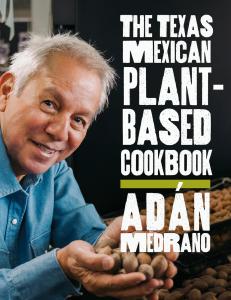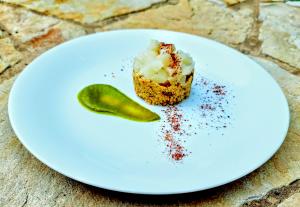Rediscovering Texas Mexican Cuisine: The Texas Mexican Plant-Based Cookbook by Adán Medrano
Chef Medrano brings Indigenous heritage and plant-based tradition to the modern kitchen — full of history, flavor, and the joy of home cooking
HOUSTON, TX, UNITED STATES, October 23, 2025 /EINPresswire.com/ -- The Texas Mexican Plant-Based Cookbook by Adán Medrano celebrates a cuisine that is both ancient and contemporary — the Indigenous cooking of South Texas and northeastern Mexico. These are dishes born from the land and its native ingredients: corn, beans, squash, chile, and mesquite. They are flavorful, balanced, and entirely plant-based — not as a modern adaptation, but as the original expression of this regional food heritage.
Medrano invites readers to see that “plant-based” and “traditional” are one and the same in Texas Mexican food. The book honors the families, communities, and home cooks who have carried these recipes forward for generations, showing that this cuisine is not a relic of the past, but a living, evolving way of cooking that continues to nourish and delight.
“This cookbook is not about Tex-Mex.”
From the opening pages, Adán Medrano makes a crucial distinction: “This cookbook is not about Tex-Mex.” While many people associate Tex-Mex with tacos, enchiladas, and melted cheese, Texas Mexican cuisine is something entirely different — older, Indigenous, and rooted in local traditions of South Texas and northeastern Mexico.
Tex-Mex emerged in Anglo-owned restaurants in the late 19th and early 20th centuries, characterized by deep-frying, heavy cumin, and melted yellow cheese. Texas Mexican food, by contrast, has a strong plant-based tradition and is shaped by techniques like roasting, steaming, and drying. Its flavor reflects centuries of local knowledge, seasonal ingredients, and family cooking traditions.
“The recipes in this book will celebrate what was overlooked," says Medrano, explaining tht in 1837, the Republic of Texas declared Indigenous peoples, the Lipan, Karankawa, and Tonkawa to be “part of the Mexican nation,” effectively erasing their identities and food traditions from public records. Later, Anglo food writers labeled the regional food of Texas as Tex-Mex, overlooking its Indigenous roots.
Medrano’s cookbook seeks to restore this heritage. The recipes represent comida casera — home-style meals prepared in family kitchens and local family-owned cafés. These dishes have long been central to neighborhood life, predating the Tex-Mex restaurants that eventually popularized a different interpretation of Texas Mexican cuisine.
Recipes and Techniques
The book features 90 plant-based recipes, each paired with headnotes that provide ingredient histories, preparation tips, and cultural context. Highlights include:
Pecan and Mesquite Mole – a rich, layered sauce using native ingredients.
Roasted Nopalitos in Chile Guajillo – cactus paddles simmered in red chile sauce.
Watermelon and Jícama Salad with Cilantro Dressing – fresh and balanced.
Herbed Corn and Jerusalem Artichoke Tart – modern interpretation of native tubers.
Enfrijoladas and Spinach Enchiladas – everyday home-style meals, plant-based and nutritious.
The recipes emphasize roasting, steaming, and drying rather than frying, highlighting traditional techniques. Ingredients such as mesquite flour, nopal, or Jerusalem artichokes reflect the land’s bounty and the Indigenous roots of the cuisine.
Design and Usability
At 224 pages and a hefty 8.5 × 11-inch layout, the cookbook makes a strong first-impression with extensive, beautiful photography by JoMando Cruz, a much sought-after Texas photo-journalist. As a nod to the artistry of the photography, the food and landscape pictures that adorn the book will be featured in a photography exhibit at the City of San Antonio World Heritage Center this November.
The recipe instructions are detailed for home cooks of all skill levels, and the headnotes provide historical and cultural context. While some ingredients may require specialty sourcing, guidance is provided to make the recipes approachable.
Cultural and Historical Significance
Texas Mexican food is part of the larger family of Mexican regional cuisines, each shaped by local landscapes, ingredients, and techniques. Medrano highlights the role of Mexican American neighborhood cafés in preserving these traditions, which later were imitated by Tex-Mex restaurants but remain distinct in flavor and history.
By including headnotes and context, the cookbook demonstrates that cooking is not just about flavor, but also about connection — to land, family, and heritage. Understanding the origins of these dishes enriches the cooking and eating experience.
Who Will Benefit from This Book
--Home cooks seeking authentic regional Mexican cuisine.
--Vegans and vegetarians looking for plant-based dishes with cultural depth.
--Meat lovers seeking delicious, innovative side dishes
--Readers interested in food history, Indigenous traditions, and cultural preservation.
--Anyone who enjoys cookbooks that combine practical recipes with storytelling.
Conclusion
The Texas Mexican Plant-Based Cookbook is both a practical culinary guide and a historical record. Medrano restores the Indigenous, community-based roots of Texas Mexican food while providing recipes that are flavorful, nutritious, and approachable.
“Texas Mexican food is a US culinary heritage— Indigenous, regional, full of history and flavor,” says Medrano.
This cookbook invites readers to explore flavors with understanding, showing that knowledge of a dish’s history adds meaning and enjoyment to the cooking experience. Every recipe is a chance to connect with generations of cooks who shaped these traditions — and to bring delicious flavors into your own kitchen.
Adan Medrano
JM Communications
email us here
Visit us on social media:
LinkedIn
Instagram
Facebook
X
Legal Disclaimer:
EIN Presswire provides this news content "as is" without warranty of any kind. We do not accept any responsibility or liability for the accuracy, content, images, videos, licenses, completeness, legality, or reliability of the information contained in this article. If you have any complaints or copyright issues related to this article, kindly contact the author above.


